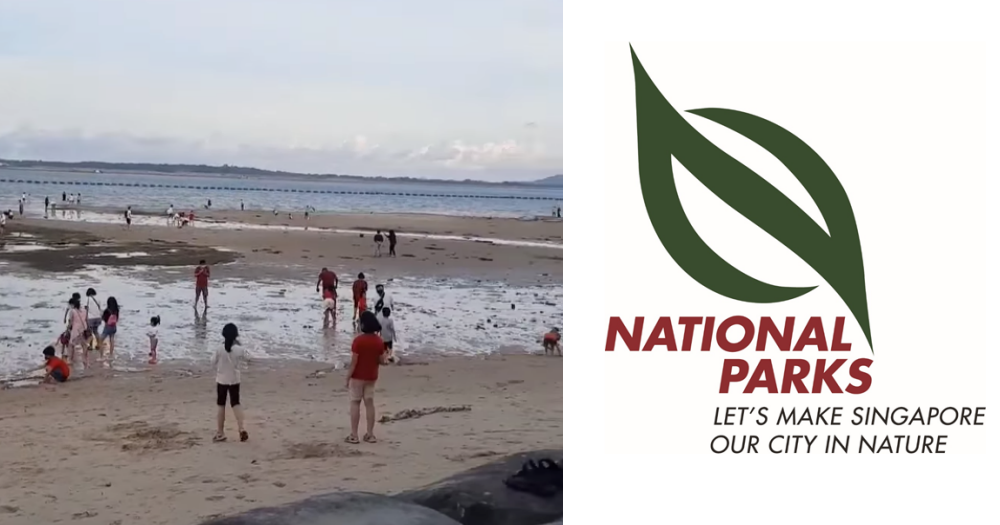Follow us on Telegram for the latest updates: https://t.me/mothershipsg
The National Parks Board (NParks) advised people heading to intertidal zones for recreation to "do so responsibly".
This means refraining from touching, collecting or trampling on any wildlife in these areas.
This was in response to Mothership's queries to NParks about crowds of people visiting and collecting sea creatures on the first day of the Chinese New Year (Feb. 1).
NParks volunteers conducted outreach at beaches on the second day of CNY
NPark's Group Director of the National Biodiversity Centre, Ryan Lee, said NParks is aware of the large crowds at the intertidal area in Changi Beach over the Chinese New Year holidays, and that people were there collecting "various biodiversity".
Lee said NParks volunteers conducted intertidal outreach at Changi Beach, East Coast Park and St John's Island on the second day of Chinese New Year (Feb. 2).
This was a day after a video by "Just Keep Thinking" went viral on Feb. 1.
"For the most part, visitors to the intertidal areas came in small groups, some as families, to explore. Some visitors did release the animals they had collected when advised to do so. We are encouraged by the interest in our native marine biodiversity," Lee added.
Singapore's intertidal areas "fragile" and "rich with marine life"
Lee said Singapore's intertidal areas are "rich with marine life".
He added that these areas support a variety of coastal and marine habitats like sandy beaches, seagrass meadows and rocky shores.
These habitats support a wide variety of plants and wildlife and serve as nurseries for juvenile wildlife such as crabs, shrimp, and fish.
Lee said these intertidal habitats are "fragile" and reminded those who visit these areas to refrain from touching, collecting or trampling on any wildlife to allow them to thrive in their natural habitats.
However, not all animals can tolerate even gentle touches, as some are very sensitive to tactile disturbances, Lee added.
Lee also cautioned that those unfamiliar with the different species of marine life may endanger their own safety if they cannot recognise stinging or venomous marine life.
He also advised the public to wear covered shoes when visiting intertidal zones to protect against sharp rocks or creatures.
NParks to intensify outreach and public education efforts
Lee said: "NParks is committed to encouraging community stewardship of our natural habitats and biodiversity in our City in Nature."
NParks will intensify its outreach efforts to educate the public to care for sensitive marine life in intertidal areas.
"This includes raising awareness on the detrimental effects of touching, collecting or trampling on marine wildlife in their natural habitats," said Lee.
Lee also encouraged members of the public to participate in NParks' Intertidal Watch citizen science programme.
He also reminded visitors to adhere to the prevailing Safe Management Measures such as wearing masks and keeping to groups of up to five persons.
Lee urged everyone who is planning a visit to an intertidal zone to visit their website, watch their video series or read up on their guide to intertidal areas in Singapore.
"We hope to keep our shores safe and teeming with life so that more people can visit and learn about these unique habitats," said Lee.
Top photos via Just Keep Thinking and NParks/FB
If you like what you read, follow us on Facebook, Instagram, Twitter and Telegram to get the latest updates.

